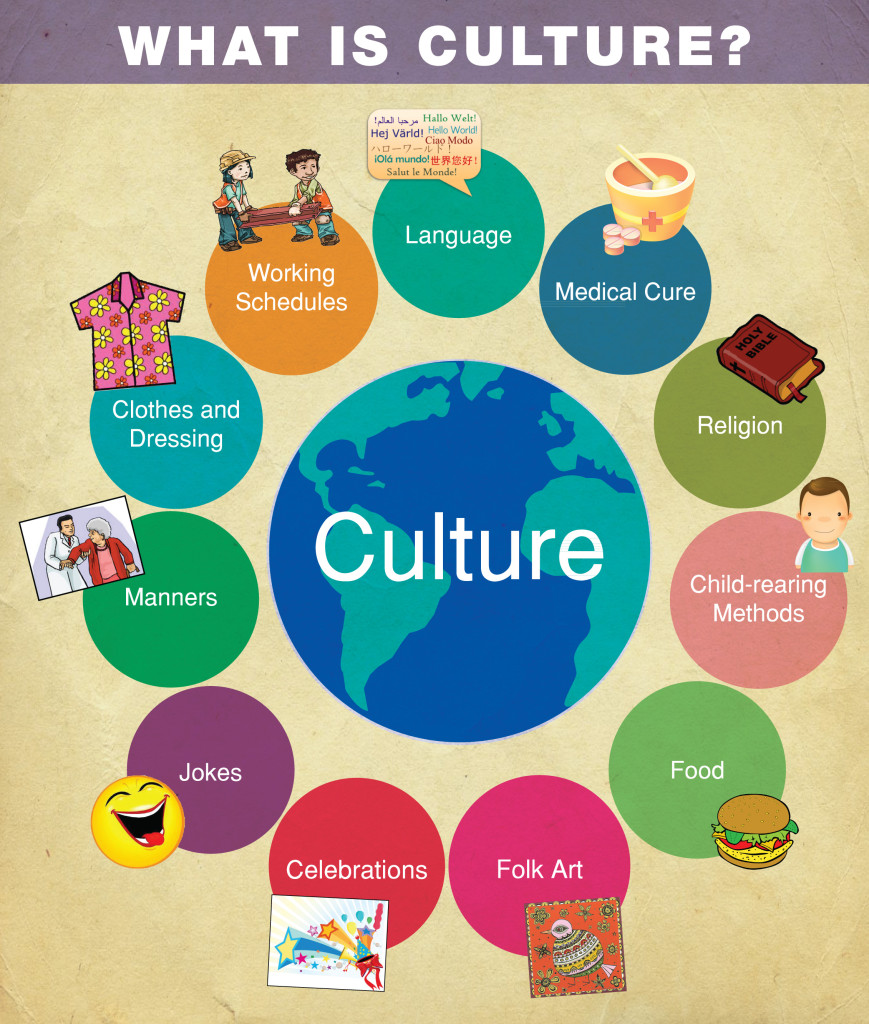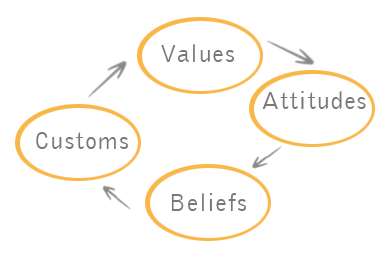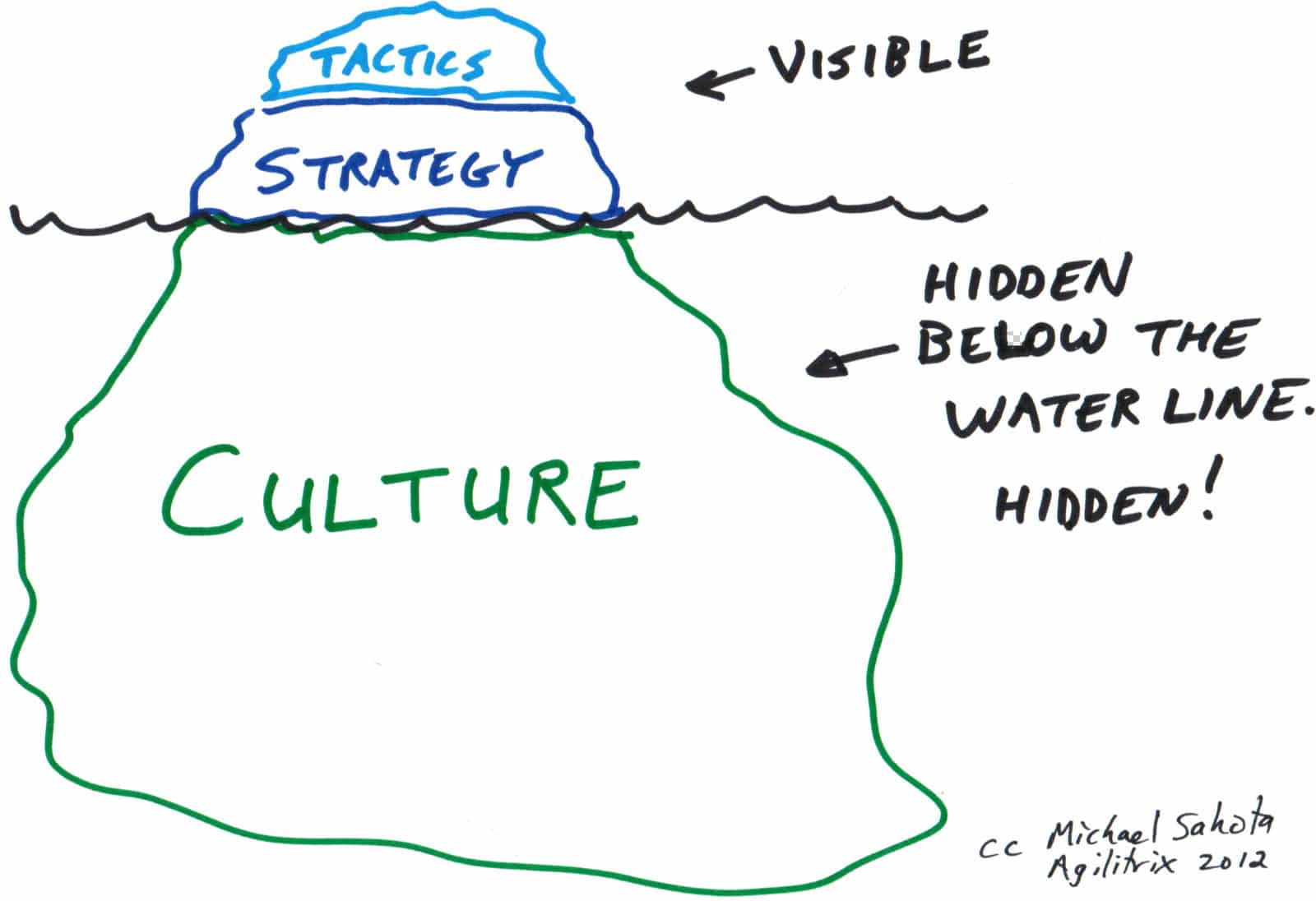
There is an old and ancient saying that you can’t fix stupid or “you can’t cure stupidity”. We disagree.
Concluding our Series on Indian Stupidity, is our fifth and final piece Culture: The Cure for Stupidity. It further investigates the consciousness and behaviours of the Indian people. While culture is partly about celebrating our heritage and traditions, it is also about understanding what we need to improve and even correct in a changing world.
Long time readers would have previously read Are We A Serious People, Indians are Talkers not Doers, Unrepentant Stupidity, and Origins of Indian Stupidity. Busy professionals and those of you reading on twitter would have seen our series of tweets on Self Improvement for Bharatiyas, which you can refer to now as a summary of our points on Indian Stupidity.
In our preceding Post, we identified the following as the elements of Indian Stupidity: Attention Deficit Disorder, Missing the Woods for the Trees, Rote Memorization, Status Obsession,Sentimentality, Sore-loserness, Inability to Shut up, Action vs Reaction, & Lack of Focus resulting from Loss of Culture.
This Post will focus on the last element, Culture.
What is Culture
Culture can mean many things to many people. To the average deracinated Indian or clueless foreigner for example, Indian culture means “caste, curry, cows” or at best, Bollywood. To others it may mean only the arts, dress, festivals and rituals of a people. The textbook definition of culture however is as follows:
In fact, the literal Latin word means “cultivated” or refined, which incidentally, is the precise meaning of Sanskrit and Sanskriti. Refinement, not only in song and dance, or food and painting, but in thinking and above all, action. Indeed, the dictionary definition is:
the total of the inherited ideas, beliefs, values, and knowledge, which constitute the shared bases of social action
Action. The very thing our modern Bharatiya bolna babus are infamous for being incapable of. This is because they have conflicting interests and motivations, rather than a common virtue, a common Dharma, a common culture. Naysayers may protest saying, “What do you mean they don’t have culture?! They know Ghalib and ghazals!“. But that is not the sum total of culture nor even the culture of the entire Civilization.
Arts are the Alankara (ornament) of culture, not culture itself. They provide medium for the expression of timeless values that give meaning to life. It is not restricted to a panth (religion), but transcends it, and connects relative with relative, neighbour with neighbour, and Bharatiya to Bharatiya. It is for this reason we have stressed Bharatiya dharma, as dharma transcends religion. Your religion is your own business, but praja dharma (the dharma of citizens) is common to all.
Why it is the Cure
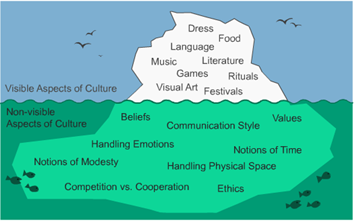
Culture teaches behaviour, Culture teach etiquette, Culture teaches good conduct, Culture teaches history, Culture teaches classics, and above all, Culture teaches Wisdom. And as has been taught since the time of the ancients, Knowledge is Not Wisdom.
Because our Dharmic culture, our Bharatiya Sanskriti, teaches these things, it counters stupidity by providing a reference point for the very ability of judgment stupid people lack. As the stupid person has a deficiency in judgment, culture instills in him or her the compass to navigate through his or her problems and through life itself.
Stepping Stones to Dharma:
Sabyata (civility), Saujanya (etiquette), Maryada (propriety), Acara (Good Conduct)
Pillars of Dharma:
Tapasya (Ascetism), Saucha (Cleanliness), Krupa (Mercy), Satya (Truth)
Definition of Dharma:
Dharma is the protection & upholding of the righteous order Rta as expressed by Satya
Culture is critical as maps may change, but the cardinal directions do not. It is precisely why the distinction is made between Sanatana Dharma and Yuga Dharma. The principles are timeless, but the rules will have to adapt to time, place, and manner. What is appropriate in one era (Satya Harishchandra) may not be in another (Yudhisthira). It is this very flexibility of Dharma that Krishna expounded on the field of the Kurus. The principle of protecting truth via dharma is superior to the rules of civility, etiquette, propriety, and good conduct. This is because dharma is the fountain of all of these, and while it can survive without them, they cannot survive without it. Without Dharma, a so-called “civilised society” may look outwardly polite and gentlemanly, but inwardly be brutish and barbaric.
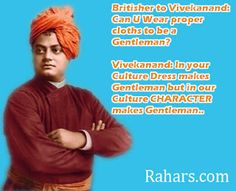
As defined above via the Latin root, the cultured person, is the cultivated person. To use the time-worn platitude, as the land left fallow does not produce fruit, so too does the untilled mind remain a fruitless existence. Indeed, a rootless person, is like a flower in the wind, blowing in whichever direction the winds of fashionability or pop culture take him or her without the benefits of…
And that is precisely the problem. This generation has failed to pass on the language, material, objects, rituals, institutions, and art to the next generation–not to mention, failed to teach their value. In the quest to ace exams, get seats in engineering, and get jobs in IT companies, a generation of rootless individuals has been produced. Macaulay’s great task has been completed. Because the sum of their attitudes, customs, and beliefs are no longer distinguishable from European, American, Arab, or even Persian views the fashionable winds of Bollywood and NCERT lead them to believe, they have become alienated from each other and themselves.
Many may argue that destruction of our attitudes and beliefs is indeed desirable, as caste and gender issues will then be discarded. But is that really the case? Even “militant” atheist and avowed secular modernist Richard Dawkins described himself as a “cultural Christian”. And all this despite the legacy of inquisition, burning women at the stake, slavery and even more unmentionable crimes that plague various churches to this day. Christianity and European civilization are given the benefits of the doubt and ample time to allegedly reform, but time’s up for the turban-wallahs? Why the exception for Indic Civilization?
America can have its “Freedom“, Europe can have its “Human Rights” (or “Christian Love“…they’re still deciding…), Persia can have its “Adab“, and China can have its “Tianxia“, but India must be denied its “Dharma“?
Others argue that this is a “brahminical conspiracy” to impose uniformity on their [ineluctable] “Idea of India”. But that is precisely why we have stressed Dharmic Culture as the foundation, because if there is an Idea of India it is Dharma, and even dyed-in-the-wool “secularists” like Romila Thapar have realized this. Dharma is an idea and ideal that transcends the modern definition of Hinduism and extends to at least 3 other modern religions, not to mention various other nastika doctrines, and the ideal of Saamanya Dharma transcends the narrow strictures of caste and creed. It is the principle that binds couples, families, communities, and the country together.
So no wonder our “baboos” have been unable to concertedly act in unison and have this shared basis for social action. The anglicized baboo is clashing with the arabized baboo who is clashing with the “brahminist” baboo who is clashing with the persianized baboo, all while the youth start dreaming of being something else entirely. This is what happens when India and Indic Civilization is denied its Dharma. No wonder its denizens have a “deficiency in judgment”–what civilizational basis does our cultural schizophrenic have to judge the proper course of social action?
Countries must become strong, yes, and adapt their values to the present era, sure, but they must not forget who they are or discard their identities wholesale in the name of progress and modernity.
https://youtu.be/iT0my2cyC1M
Nevertheless, the naysayers may still shake their head in pseudo-secular stubbornness, so let us conduct a closer examination of how being shorn of Sanskriti causes stupidity.
How Loss of Culture Causes Stupidity
- Habitual Binary Thinking
- Lack of Emotional Awareness
- Low Threshold for Tolerance
- Lack of Shame
- Inferiority Complex
- Received Wisdom: AKA Policy Over Principles
- Inability to Problem Solve
- Act First, Think Later
- Preoccupation with the Mundane
Habitual Binary Thinking
Hot-Cold, Up-Down, Left-Right, Ascetic or Hedonist, Primitive or Modern, Parochial or Global, Secular or Communal, Capitalist or Socialist, Cool or Lame. Loss of culture first and foremost leads to simplistic binary thinking, and in the process, gives us a severely limited understanding of Right vs Wrong.
Typically these dichotomies are driven by heuristics. Like so many mice in a maze, rootless individuals are taught only by shocks that indicate their progress to the cheese. Shock-No shock, Yes-No, With me-Against me, Friend-Enemy. Limited binary thinking leads to unexamined heuristics.
Such a society also leads to extremes in gender roles. Men are expected to be hyper-masculine and women hyper-feminine (usually a euphemism for hyper-sexual). But look up the reputation of the Sacred Band of Thebes and Amazons to understand what uni-dimensional gender constructs create.
It is why our Indian heroes…our real Indian heroes…our great Kings and Emperors were not either 1 dimensional blocks of testosterone or milquetoast, emasculated savants of the arts, but possessed both manliness and cultural refinement: the bow in one arm and the lute in the other . Therefore, in raising children, the question is not boxing or book-reading, kalari or karnatic, vaana or veena, but both.
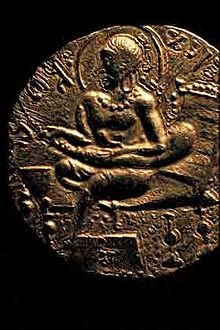
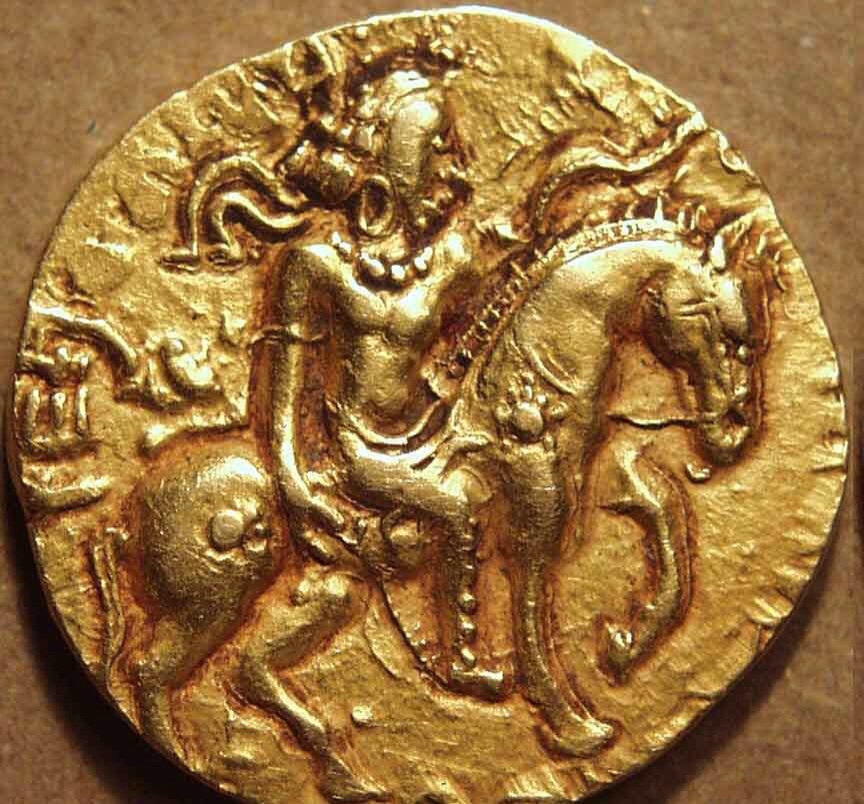
Maharajadiraja, Samrat Samudra Gupta with veena & vaana
Even our heroines weren’t uni-dimensional damsels in distress. They were (and are) strong women with minds of their own (from Sita and Savitri to Upakosa and Ubhaya Bharati). Indic Civilization valued not only the matchless beauty of our women but also the peerlessness of their brains and the timelessness of their values.
It was, and is, also not a society that shied away from female sexuality; rather, it celebrated it. One need only read a verse of Kalidasa to see this. Indeed, it only recognized that kama was appropriate based on time/place/manner per one’s Dharma. But while binary thinkers only see sexually-liberated vs prude, Dharmic thinkers are context sensitive.
Dharma is subtle, and so, it recognizes changes in situations, and circumstances, that make absolute rigid rules difficult–and so, it stresses principles instead.
Lack of Emotional Awareness
Our average Indian plain and simply lacks emotional awareness.
A creature of pure sentiment, he laughs when he is happy, tears up when he is emotional, complains when he is hungry, and becomes pusillanimous when he is fearful. Rather than keeping his wits together and asking what is the proper course of action in his long term interests, his sentiment of the moment dictates his action, which is duly rationalized later. When internal conflict isn’t delayed or minimized, what society can cohesively tackle its issues? When individuals can’t manage their emotions, how can they keep their friends and allies, let alone deal with their enemies and problems?
Without stepping outside of one’s self to evaluate our own behaviors dispassionately, how do we know if a course-correction is required? How can we judge whether we were right or wrong? We can’t, hence deficiency in judgment being the near text book definition of stupidity.
Low Threshold for Tolerance
With the lack culture comes lack of patience. And with that, comes a low threshold for tolerance. Tolerance of pain, opinions, fear, odds, and even scale of work ahead.
Like bipolar children, the decultured individual begins to respond to incentive in a manner similar to Palvov’s proverbial dog. As such, not only internal impulse, but external stimulus drives behaviour, rather than judgment.
Lack of Shame
This is one of the few areas where India has not been completely transformed for the worse…yet. The words “kuch tho sharam karo” still have some meaning. And so, we will have to turn to avante-garde America for illustration.
From Paris Hilton, to the Kardashians to the proliferation of reality tv, the death of shame has been documented in detail by Western societies.
America in particular, for a period, decried the demise of self-respect. But the birth pangs of the 2000s have led to the terrible two’s of the 2010s. Shame simply no longer exists in vast areas of societal interchange, and attention has become the invaluable currency of ingénues.
Leave aside our Bindaas Big Boss shows, the wholesale Bollywood mainstreaming of Sunny Leone has and will lead to the death of shame in India as well.
And this is not a broadside only at ladies. Men too have been and are subject to this. Slowly but surely, their sense of responsibility has been diminished. Many no longer take care of their parents, leave aside supporting the children they sire out of wedlock. The entire purpose of marriage has been diminished from the joining of two souls and the foundation of family, to a notch on the bedpost of life.
Of course, this doesn’t mean being a repressed person for repression now can lead to eruption later. Rather, it means finding balance between prudery and prurience. If one chooses the path to asceticism, it should only be through guidance and with yogic balance. As Lord Krishna says, one who represses is lying to himself. The key is awareness and management. That is why Grihastha ashrama (being a householder/family man/woman)is prescribed for most people, as sanyasa is very difficult, especially in the prime of one’s life. It also means have a sense of self-respect and a sense of shame. Without shame, we end up looking like buffoons.
Gullible Buffoonery
Read one article, and our morons and moronis think they are educated. One word of praise, and they gush with bollywood sentiment. Release motivated media campaigns, and they think foreigners have no agenda when “they are showing us the mirror”…
They are showing us the mindset?—of what? Some criminals and the unscrupulous lawyers using any tactic to win a case? Is this a uniquely Indian thing? The question our gullible, Rang de Basanti watching, college going buffoons should ask is whether the same mirror and media campaigns are there for these same societies.
These youthful yutzes proclaim “oh don’t be stubborn, don’t just recite statistics”. But statistics matter, not your personal anecdotes. There are even statistics for under-reporting. If you don’t take even those seriously, who then is being stubbornly illogical?
Using foreigners to settle your own scores is the time tested tactic for self-destruction, and emblematic of gullible buffoonery. This is because people who share a culture know they have less reason to suspect the intentions of the other towards their society. In fact, True Romans were considered to be those who were suspicious of foreigners. This doesn’t mean paranoia or xenophobia, but merely healthy self-respect and societal regard. After all, a fellow citizen has a duty to your society, a foreigner does not.
As we have written previously, rather than spending years understanding an area—the bits and pieces of received wisdom are congealed to create a walking moron of heuristics. Instead of firmly establishing views on logic—logic is contorted to fit the view. And the frenetic, even nervous, energy is fired off in a machine gun burst of buffoonery.
This is compounded by obsession with global perception rather than national principle. Perceptions are important, but perception is not reality. When you are driven by perceptions rather than principles, you become putty for pop-culture. Driven by fashionability, you feel that anything you have or do that is not trendy is inferior.
Inferiority Complex
Many people often suffer from inferiority complex. They feel whatever they have, whatever they eat, or wherever they come from is not as good as certain parts of the world. As we said above, youth may even want to become something else entirely. Accents are faked, even sports affiliations are affected, all in the name of trying to fit in somewhere else. What these poor pathetic souls don’t realize is that the in group they are trying to join is laughing at that the self-declared affiliations, even if they are polite to your face. There is nothing more pathetic than a wannabe.
In fact, rumors have it that the entire reason Nehru affixed the undeserved “Pandit” as an honorific was because he was jealous of Shri Ambedkar’s academic accomplishments. As such, even superiority complexes are very frequently (though not always) the product of an inferiority complex. .
It also causes people to debate to oblivion. Debate in its intended form is about discerning the truth. That is the literal meaning of Dialectics. While competitive debate, vad-vivad, is a great skill to develop, it must be done using logic, nyaya/tarka, and with the understanding that arguments must be logical. But this is what debate has become today.
As a result, our decultured Indians are unwitting chumps in a game that requires high confidence and high emotional awareness and high threshold for tolerance. Being angry, losing one’s self-control, unleashing a flurry of f-words is not the way to win the audience. In fact, rather than revealing the truth about the topic, it only reveals the truth about one’s self being a coddled little mama’s boy.
Mummy Approved Egos
It is not for nothing Mothers are referred to as the first guru. Thus, our inferiority complexed individuals are overly dependent not only their mothers’ received wisdom, but their approval as well. “But Mama said” becomes their byword. A mother’s authority is not to tyrannize or train to do tricks like a poodle, but to teach how to think and relate to the world. Her child, boy or girl, should be armed with principles and given advice that can be adapted to time and place. A mother should also not smother her child so much that he cannot take criticism, or not have his views challenged. A slight or even an insult, should not set him off into a wild rage.
Mummy approved egos place premiums on received wisdom
Received Wisdom: AKA Policy over Principles
Better known as the Gyaani complex, received wisdom and rote memorization is the modus operandi of our decultured person. It is in effect, hearsay. While their fellow decultured may decry, saying culture just imposes dogma, which is itself received wisdom, this is incorrect. Culture gives us principles so as to evaluate. Rather than a rigid rule book that is a one-size-its all for all time, it gives us principles and stories and practices to evaluate truth. Marxist minions may shriek “there is no truth, only perspective!“, but they are trained to deconstruct to oblivion. Rebels without a cause, relativism is their religion, hence truth isn’t accessible to them. When even Wikipedia emphatically asserts the need for a Neutral Point of View, how then could there not be truth? Of course there is, it may not be completely perceivable to mortal eyes, but logic, judgment, and patience eventually allows us to discover all or at least most of it.
But our sarvagyaanis aren’t concerned with truth or principles, they are concerned about policies. Whatever their guru-sishya paramapara has taught them, they shop around intensively, from soapbox to soapbox. That is received wisdom–not flexible principles for dealing with problems, but the same solutions for every problem. Binary thinking teaches them to respond only to whether a person supports or opposes their policy. “You are not for free-market capitalism?–Well you must be ya-gainest wealth and for socialism!“. “You are not absolute pro-choice, then you must be against women’s rights!”Thus, the decultured person is trained to think only in terms of policy, not principles. Nuance becomes neutered, and emotional screeds substitute for rational argument. This also leads to Personality Cults.
Personality Cults
One of the oft-frequent complaints of gurus throughout the ages was focus of sishyas on master rather than message. There is a proliferation on social media of would be saviours who specialize in reciting the mahavakyas of the adi acharyas of their paramparas, memorizing those lineages, and fan club ization of their personae. While there is absolutely nothing wrong in reverence or idol worship, idolization is problematic.
Idol Worship (Murthi Puja) is perfectly righteous in Dharma traditions. Idle Worship, however , is not.Karma, especially, thoughtful action, is critical.
Received wisdom may not even have the veneer of being wise. Simple even brainless pop culture trends drive fashionability rather than genuine merit. We saw it on TV so it must be cool, we heard it on the radio so it must be good, our peer group is doing it so it must be followed. While pop culture can in be fun, it cannot be a foundation. This is all the more when pop culture, even culture itself, has become commoditized. This makes high culture and a classical education all the more important, so that mores and morals can be separated from markets. Trendy thought leads to Group Think. Group Think, in turn, leads to Group Action. Therefore, such individuals become devotees of personality cults, rather than practitioners of problem solving.

Inability to Problem Solve
Our IIT grads and engineering batch may revolt in general at the very notion, but is it really so far from the truth? Sure, after many years of coaching centers they are trained to answer questions. They may even learn how to build rockets and put them into space based on prior scientific breakthrough. But the question is, do they know what to do when a completely new problem or multi-dimensional, multi-disciplinary issue stares them in the face?
They may even be trained to analyze, but is this analysis to problem solve or analysis to paralysis? True problem-solving takes into mind that one cannot possibly know every fact in a situation. A degree of uncertainty will be required, as well as willingness to consider alternatives by stepping outside of the situation. Rather than viewing the world as mere functions, entire paradigms must be evaluated, and then reevaluated. That is the difference between merely getting an answer and solving a problem. That is the difference between tactical thinking and strategic thinking, which is at the heart of real world problem solving. Rather than viewing it through the tunnel vision of just engineering, just politics, just economics, or just philosophy, true problem solving attempts to understand the relationship from all those perspectives and determine the best outcome for an organization or society.
Act First, Think Later
When one has lost his or her culture, there is a pressure to act immediately. Rather than pay attention to social obligation or have basic etiquette, impulse becomes the driver. The immediate need to know what else is there or to chase after what we might be missing becomes more important than what we actually have.
This is precisely what happens when people lose their culture. No etiquette, no decency, no brains.
Preoccupation with the Mundane
The decultured person is easily drawn to the mundane and distracted by mere trinkets. Dwelling forever in the realm of the senses. Money, Lust, and Gluttony become the chief occupants of his or her life.
Because culture teaches values, because culture teaches delayed gratification, because culture teaches that there is more to life beyond animal impulses, the deracinated person becomes chiefly occupied even obsessed with mundane sense gratification. Relationships, careers, even life itself suffers under slavery to the senses. Ignorance becomes bliss.
How Culture Cures Stupidity
In our previous piece, we provided a Kant quote that defined it as the following: “Deficiency in judgment is properly that which is called stupidity”. As we’ve explained above, culture is the cure for stupidity as it provides a principled base for judgment drawing from the time-tested history and experience of a tradition and people.
So how does culture provide judgment?
- Holistic Thinking
- Emotional Management
- High Threshold for Tolerance
- Dignity, Honour and Respect
- Self-confidence
- Principles Prior to Policy
- Ability to Problem Solve
- Think First, Act Later
- Elevation rather than Debasing
Holistic Thinking
How did they beat you?
While the binary thinker is subject to Macaulay’s colonial attitudes demarcating x as inferior and y as superior, the holistic thinker does not view the world in zeros and ones. He or she doesn’t simply assume a circumstance for all time, but understands and evaluates…why?
Contrary to commie commentators, the Classical Indic Education is not merely about rote memorization but is about constant questioning. The Upanishads themselves are an exploration into the “why” and “how” and “what” of existence. The Classical Indic Education, whether self-driven &/or gurukul-based, ensures rootedness that does not substitute for, but should be combined with, modernity-derived knowledge. In doing so, one is equipped to critique the origins and originators of “modern” knowledge. Rather than mice in a maze or robots programmed to operate on command or poodles trained to jump through hoops, we begin to think independently, consider matters from all angles, and above all, keep our wits.
Emotional Management
When you are an holistic thinker, you begin to understand that you are not just an individual or a consumer in a market, but a member of a society. This does not mean socialism or communism, because systems that overly concentrate or overly centralize at the national level, begin overtly interfering in families…even breaking them.
Holistic thinkers have internal discipline that comes not from the pain of lash, or fear of an exam result, but from commitment to an ideal. They recognize that a society is more than the sum of its parts. That relationships matter, families matter, communities matter, and that country matters. Rather than viewing nations as merely composed of individuals, such a person considers all these elements. Feeling a part of a society means not feeling alone either–yet another driver for sputtering hyper-activity and aimlessness. But above all, the holistic thinker has a ready arsenal of niti, lessons, that stem from his or her education.
While the great Sanskrit epics are a veritable storehouse of niti, it is the Panchatantra, with its pithy maxims, that is most accessible to even the common man-child. Silence is golden. Every dog has its day, Knowledge is not Wisdom, all these simple guides not only provide practical lessons to survive conflict in society, but reveal the universality of our tumultuous emotions…and how to manage them.
Every human being feels envy at some point, but culture provides the insight into being aware of one’s emotions and how to manage them by recalling such time tested lessons, which neutralize envy in favour of optimism for our own day yet to come. This emotional maturity, in turn, helps us deal with adversity, even in the most trying of situations.
High Threshold for Tolerance
https://youtu.be/mPlHJbO4Ntg?t=31m27s
Adversity not only tests a Man or Woman’s valour, but also a Man or Woman’s Dharma, a Man or Woman’s culture. It is such adverse circumstances, where injustice is done, where relatives divide, where property or wealth is at stake, that a family, indeed a society, shows its culture.
It is the culture of Sri Rama and the House of the Raghus that allowed them to bear the burden of not one but two tragedies. It was their Dharmic Culture, their sense of virtue, of right and wrong, that ensured that the rightful heir would ultimately, after all vows and promises were kept, be restored to his rightful throne. Rather than selfish individuals looking to maximize personal utility, they selflessly competed with one another in altruism, ensuring that Dharma, rather than matsya nyaya (big fish eats little fish) determined the best outcome for all.
Look at the supreme and peerless grace of Bhagvan Shri Ram, and the forbearance with which he accepted being disinherited in favour of his younger brother. Look at his unselfishness (and that of other family members) in thinking of the good of the family, the kingdom, and the fame of the Ikshvakus as a dynasty that always keeps its word. Sons have given up their lives to keep their father’s throne, but which other son has given up his own throne to keep his father’s vow? Such is the nobility of Rama and the refinement of his culture that he had this high threshold for tolerance.
Dignity, Honour and Respect
With a high threshold for tolerance, comes dignity, honour and respect. This comes not only from the regard people have for the unselfish and commendable conduct of individuals like Sri Rama, but also from the self-respect that comes from virtue.
Before our culturally confused pseudo-secularatti screech and holler in outrage, let them read what the author of The Social Contract and famous European Enlightenment thinker himself said. Jean-Jacques Rousseau wrote that simplicity is better than complexity, but if we must have a sophisticated culture, let it celebrate virtue:
It is by following this example that the truly great monarch…drew from the very bosom of the arts and sciences…the dangerous trust of human knowledge…yet the sacred guardians of morals…
Those Academies also, which, in proposing prizes for literary merit, make choice of such subjects as are calculated to arouse the love of virtue in the heart of citizens…not only by agreeable exercises of the intellect, but also by useful instructions. p.92
Our globalized sepoy sophisticates may balk at the Indian’s dharma, but what will they say to the Frenchman’s virtue? “What is the need?”, they may ask “We have secularism, science, and…technology!” But here’s what Rousseau himself wrote:
We have physicists, geometricians, chemists, astronomers, poets, musicians, and painters in plenty; but we have no longer a citizen among us
Thus, it is love of virtue that leads a citizen to do his duty or give respect to another. After all, a gentleman behaves with courtesy to a Sita or Surpanakha alike, not because of what it says about them, but because of what it says about him. It is his sense of virtue, his sense of Dharma, that not only gives his respect to others, but commands respect from others, affirming his own confidence in self.
Self-confidence
Respect from society and self-respect lead to self-confidence. The poor hapless, deracinated Indian is subjected with mockery for not looking like a European or a Persian, given fairness creams to allegedly become lovelier, taught foreign language and history rather than native ones, and told native traditions and sciences have no value. Is it any wonder he or she has an inferiority complex today? This is the result of alienation from culture.
Whenever someone insults you or your people (“dark”, “invaders”) culture teaches you to deflect those bullets (beauty in eye of beholder—some prefer less some prefer more pigment, Battle of Rajasthan, Vijayanagara, Marathas, Sikhs). This applies even in the case of gender “women are weak” (Vivekananda: “How are women weak? What man has the internal strength to give birth”[paraphrase]). That is the value of culture.
It also means being able to innovate and even adapt as being cultured doesn’t mean being hide-bound. One can be rooted and cosmopolitan at the same time–it is merely a question of prioritizing.
Principle Prior to Policy
The gyaani complex is one that is oft-complained about and is oft-analyzed; what is not oft-discussed, however, is the solution, and that is culture.
As we wrote above, received wisdom is the mantra of the gyaani. He touts his un-analysed assortment of heuristics and hearsay as the solution for every problem, and not only will he brook no opposition, he won’t even listen to opposing views. His “chankian” strategy is the silver bullet.
In contrast, culture in fact teaches to problem solve (study the history, study the nature, read the accounts of the ancients, adapt to the circumstances). Culture will also help us determine the difference between useful learning and pedantry. As Rousseau decried “We do not ask whether a book is useful, but whether it is well-written” (ibid). This is yet another problem with our gyaanis today. They are more keen on demonstrating their intellect, hence the IQ obsession, rather than doing something useful. In contrast, culture doesn’t emphasize poodle tricks on an exam, but competence and character. Unlike our sarvagyaanis, it recognizes that knowledge in one area doesn’t certify knowledge in another.
We must distinguish between our Kautilyas and our Mandana Mishras. Just because you read a book or two on philosophy doesn’t make you Adi Sankara, just because you read a book or two on history doesn’t make you Shivaji. Bloated egos must be put aside; ambition and tempers deflated for common good…or at the very least, personal prudence.
Binary thinking leads to inability to deal with significant grey areas and pervasive uncertainty. People don’t always show their hand. Shakunis don’t always reveal themselves to their Nephews, if at all. This is the value of the value of shut up. Big mouth know it all Indians live in the binary world of best friend-worst enemy. They need to focus on interests. Interests, values, objectives, tactics, strategy, and above, all, culture.
Because it helps us prioritize correctly, it also helps individuals and even groups to problem solve.
Ability to Problem Solve
Even the most skillful strategist cannot lead his team to success if it’s composed of stupid, argumentative idiots. No matter how brilliant the strategy, a team of selfish, jealous, petty unthinking people cannot accomplish a major task. Thus to fix the stupid, one must rely not on strategy, or “reforms”, or laws, but culture.
Rote-memorizers cannot be senapatis. Sarvagyaanis cannot be sainiks. Logic, the School of Nyaya, must help us navigate this deep into the Kaliyug. It cannot just be recited without thinking, logical bases must guide the use and recitation of knowledge.
What’s more, simply because one has read the Arthashastra does not make him or her a master of politics and war. Just as vidya and buddhi are different, so too are vidya and karma (action). It is for this reason Dharmic society traditionally had separate vocations for especially brahmanas and kshatriyas. This is because just as fundamental science is not the same as applied science, so too is vidya different from karma.
Finally, culture teaches individuals to usefully apply their knowledge and to resolve conflict with humility. To non-profanely paraphrase a French saying: “[Crap] in a silk stocking is still [crap].” Mere expensive clothes or literary pedantry or even outward piety is not culture. And that is the case today in India. Not only with our nouveau elite, but with our paleo-elite as well. If the former behaves brutishly due to its “global” education and pseudo-secular attitudes, the latter behaves arrogantly due to puja, punya, or punaskara. Neither brutishness nor arrogance are good for society, nor for solving its problems. One leads to its unraveling or explosion, and the other by alienating non-elites, to implosion. Therefore, real culture places problem-solving above poseur pedantry.
Think First, Act Later
While the cultureless are driven by hyper-activity or a desire to embrace the fashionable, the cultured take a moment to reflect on the proper course of action and have the ability to follow through. This is why culture eats strategy for breakfast. An individual, a family, an organization, a society at harmony will have the ability to not only devise the right strategy and implement the right tactics, but have the cultural wherewithal to execute properly.
What’s more, a sound culture, has a strategic culture that teaches you to think about and reflect upon your actions. It will advise you on the importance of drawing from other sides as needed. As Rajiv Malhotra has re-popularized, Purva Paksha (studying the other wing or camp) is part of our culture. By properly studying the other side even before we open our mouth, we will know when to keep it closed.
Above all, it teaches you when not to act and how not to act. Rather than being driven by your senses or thoughts to the mundane, culture elevates you to act in accordance with the elevating.
Elevating instead of Debasing
Culture redirects from the mundane and commonplace to the complex and transcendental. Notice we didn’t say simple. In fact simple living is considered the ideal not only in our Dharmic tradition (we will touch on this in a future post), but in others such as the Daoist of China.
Some may argue by saying, “Vell, aren’t there societies with vulgar art and prurient poetry. Are you saying then that they don’t have culture?“. I’m saying such a culture has degenerated or perhaps was degenerate ab initio. Culture as we defined above means cultivation or refinement, not only of the arts, but also of behaviour. Ours is a culture where even the most animal of actions, sexual intercourse, is spiritual in its highest and most correct form. That is culture. Not one that reduces pleasure to selfish button pushing or chemical release, but that shares pleasures with one’s other half. Indeed, when done correctly, sex becomes about prioritizing the giving of pleasure rather than receiving…ultimately making the experience for both greater than the sum of parts. This is why society explicitly attaches sex with love. Because if you really love someone, their pleasure becomes more important than your own. It’s also why teleologically, it’s an act meant for two, and why monogamy is ultimately superior to polygamy.
A rancid culture is selfish, self-serving, and debasing. No act becomes unacceptable in the quest for pleasure. This is the danger of hedonism. Not because of where we start, but because of where we ultimately and even unintentionally end up.
Though by and large discredited as either debunked or derivative, Freudian Psychology remains relevant with respect to the theory of the Super Ego.
Id, Ego, Super-Ego
When we first experience animal urges in great strength—lust being the most infamous—it is often quenched with abandon. The less spiritually inclined among us may wonder “why would we ever want anything else”, “forget how, why should this even be resisted”. In effect, all other actions become merely ancillary in our central quest for this feeling, this rati bhava , this Id.
But the Ego reminds us that we have responsibilities if not consequences so that our other needs may be met. And the Super Ego provides us with a conscience. That voice that says, this may be good, even very good for a while, but ultimately it leads to bad. We ever so slowly grow to realize that prioritising the feeling (rather than enjoying it as a byproduct) turns it into a drug. As Swami Vivekananda replied to the question “What is poison?”—Anything in Excess.
Thus, physical pleasure is not poison, lust is. Tasty food is not the poison, gluttony is. Culture therefore teaches us to prioritize correctly. Love before sex (but certainly in conjunction with it). Nutrition before taste (but certainly in conjunction with it), Logic before sentiment (but certainly in conjunction with it), Duty before relational attachment (but certainly in conjunction with it), Public interest before self-interest (but certainly in conjunction with it), Civic pride before personal pride (but certainly in conjunction with it), and Social advancement before personal advancement (but certainly in conjunction with it).
The perceptive among you would quickly see how I have founded the above paragraph on our Dharmic caveats against the Arishadvargas (six enemies: Kama, Krodha, Lobha, Moha, Mada, Matsarya) or better known in its variation as the Seven Deadly Sins (lust, gluttony, anger, greed, pride, envy, sloth ).
Therefore, culture cannot just be rhetoric, but must be lived. This means more than just chest-thumping about theorized accomplishments of the past. It means understanding your heritage, who you are, where you came from, and why your family maintains certain customs, and why they matter. This is more than just about rites and rituals, but understanding the ideals and principles of your society that make life worth living, and your civilization worth protecting. That is the true value of Poetry, Philosophy, Art, Architecture, and Literature: to inspire the unselfish and virtuous in society.
If stupidity is the inability to prioritize, selfishness in many ways is about a refusal to prioritize (society above self). That is the importance of dharma, not merely as a slogan or a convenient umbrella, not merely an excuse for self-glorifying pedantry or show of learning, but as a principle to be lived as part of a living culture. Thus, we once again come to culture as not only the glue for nations, but the nurturing soil that germinates virtuous sons and daughters, selfless leaders, and strong societies.
Conclusion
The pervasive problem of Indian Stupidity is one that will not disappear overnight. Indeed, it is one that will take as much individual effort as it will community consciousness. This multi-part series, this exegesis on stupidity is not one that was done to demoralize or to deride. Rather it was done to diagnose and cure the problem facing India and Indic Civilization today.
India may be developing materially, but it has and is declining culturally. As Rajiv Malhotra has communicated more incisively and passionately than anyone else, India’s pop culture has become a widespread consumer product, but its high culture has been derided, deconstructed, dishonestly labeled, and is in the process of being digested.
When a people do not know where they are from, how can they possibly know where they are going. Foreign colonial languages are touted as native “link” languages, because you see, it is better to have everyone under an equal slavery than have a first among equals. Because culture has been reduced to merely the arts, and increasingly, merely the crafts, India and indeed, large parts of the world, are active musically, artistically, gastronomically, and even poetically, but have declined culturally and spiritually.
The colonial meme of the 3 blind men of “hindoostan” has become the most appropriate description for the proponents of the neo-colonial “idea of India”. In the name of “composite culture” they subsume everything and in the process, reduce an ancient civilization to nothing. India is a multi-cultural civilization, but it is not a multi-civilizational civilization. How can it be? When people have no sense of respect for their own heritage and don’t even have a proper sense of their own identity, how can they possibly engage intelligently with the modern world?
Thus, rather than merely continuing in this recursive loop of retrograde behaviors, it is time to recognize the core origin of this stupidity: Loss of Culture, real culture. Dharma is the foundation and well-spring of our culture, and should be adapted to the needs of the present. It is not “modernity or tradition”, but both. It is not “pop or classical”, but both. It is not “cosmopolitan or rooted”, but both. And it is not development or dharma…but both. Only then, and then only, can Indian stupidity be cured.
The timeless truth of individuals, nations, even civilizations is that if you don’t know where you are from, you don’t know where you are going.
https://youtu.be/O1TyQBdj8_U
We have railroad, cannon and western clothing, but we cannot forget who we are and where we come from

References:
- Malhotra, Rajiv. Sulekha. 2012. http://rajivmalhotra.com/library/articles/response-postmodernist-charge-essentialism/
- Malhotra, Rajiv. Sulekha. 2002. http://creative.sulekha.com/the-axis-of-neocolonialism_103313_blog
- Rousseau, Jean-Jacques.. The Social Contract and Discourses. BN. 2007
- http://www.rediff.com/news/slide-show/slide-show-1-indias-english-obsession-must-end/20140626.htm
- http://www.niticentral.com/2014/06/28/revitalising-indian-languages-will-unlock-our-civilisational-genius-232436.html
- http://www.openthemagazine.com/article/art-culture/a-historical-sense
- http://www.niticentral.com/2014/07/19/english-medium-education-and-its-place-in-india-233720.html
